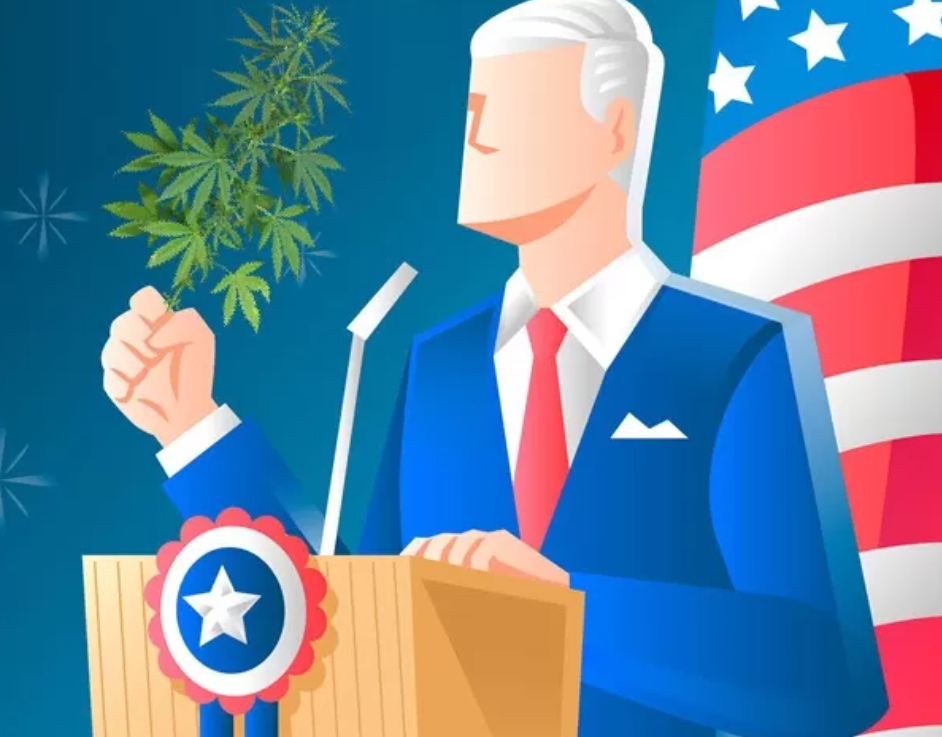Crime
How Hard is President Biden Trying to Get Cannabis Inmates Out of Jail?

Biden Says He’s ‘Working On’ Bill To Release Cannabis Inmates: should we trust him?
Can the President free incarcerated cannabis inmates with his executive powers? Yes! But can we believe President Biden when he says he’s working on it already? We don’t know the answer to this.
The Biden administration has announced several times that they’re taking steps to pass cannabis reforms; however, they’ve yet to enact or implement any. So, this could be one of the President’s techniques to make it seem as though he’s effecting changes. Or who knows, he might probably be doing it this time.
Some days ago, United States of America President Joe Biden told reporters in Washington that marijuana use is not enough reason for anyone to be locked up in American prisons. He stressed that no American residents should be behind bars because of cannabis use. He mentioned that his team is working on a bill to fulfill one of his campaign promises to free inmates locked up based on marijuana-use charges.
Another Presidential Promise to Pass Cannabis Reforms
Following a four-day visit to Israel and Saudi Arabia, Biden made the remarks to a group of media gathered on the White House grounds as he returned to Washington, D.C.
A journalist inquired if the president meant to keep his campaign plan to release all the cannabis offenders in prison. According to a White House pool report, Biden had responded by saying, “I don’t think somebody should be in jail for using marijuana. The President had also stated further that his administration is already working on the Crime Bill.
Since his administration commenced last year, Biden’s quick reply was his most in-depth and direct remarks on marijuana legalization. The President has mostly shied away from questions relating to cannabis. However, this statement is also something Biden had repeatedly declared, most memorably while running for president in 2020. Biden has consistently advocated against marijuana-related incarceration, even though he hasn’t fully embraced outright cannabis legalization.
In a notable discussion with The Breakfast Club in the spring of 2020, Biden outlined his position on full legalization vs. decriminalization, arguing that it makes no logical sense for individuals to go to prison for pot use.
“Because they’re trying to determine whether or not marijuana use has many effects, not in terms of getting you to use other drugs, but in terms of what it induces. Whether it has an impact on the brain’s long-term development, and we should hold off until the research is finished,” Biden added that scientific evidence should determine how this goes.
Plea For Pardon
Last November, three Democratic senators wrote a letter to Vice President Biden pleading with him to pardon everyone convicted of nonviolent cannabis charges, whether they are in or were previously incarcerated.
Senators Elizabeth Warren, Ed Markey, and Jeff Merkley wrote in the letter that although our nation’s marijuana laws need to be completely revised, the president has the authority to take immediate action. President Biden can and should pardon all non-violent federal cannabis felonies, keeping his pledge to the American people and improving the lives of millions of citizens, they wrote.
His recent comment, though appreciated, as well as his refusal to outright support cannabis decriminalization, has frustrated so many cannabis reform advocates. This has made most of these individuals (democrats and republicans) focus more on enacting state-level changes.
The senators pointed out the president’s campaign statement where it was noted that the government should decriminalize marijuana, and everyone with a marijuana conviction should be released from prison, have their records erased, and have their criminal histories wholly erased.
A general pardon is the first and easiest stage in the procedure. As past leaders have done, the Constitution gives Biden the power to pardon large groups of Americans when there has been a serious injustice.
Biden shortened the sentences of 75 people incarcerated for minor drug offenses in May and granted three full pardons.
Democrats in Congress strongly favor legalizing marijuana, but this backing has not yet resulted in changes to current legislation.
Other Efforts To Pass Cannabis Reforms
The Marijuana Opportunity, Reinvestment, and Expungement (MORE) Act, which would exempt marijuana from the federal Controlled Substances Act, was endorsed by the Democratic-controlled House of Representatives in April.
However, the legislation has since stagnated in the Senate, where Democratic leaders have declared their intention to introduce a bill to legalize marijuana.
Chuck Schumer, the Democratic leader in the Senate, promised that congress would introduce pot legalization before the August Congressional recess and that it would also exempt cannabis from the Controlled Substances Act in April.
However, there are increasing signs that the Senate’s draft law may be much more limited than Schumer had anticipated.
Despite frequently stating his advocacy for abolishing federal prohibition, Politico reported earlier that Schumer lacks the numbers to enact a comprehensive marijuana decriminalization bill. As a result, Senate Democrats are looking for a marijuana common ground.
In addition to the trio’s letter, Biden has gotten roughly a dozen letters urging him to take action against those still detained by the federal government for marijuana use from congress members, activists, entertainers, and those affected by prohibition.
According to these concerned advocates, the president’s present position hurts thousands of Americans, stifles scientific studies, and denies Americans the right to use medicinal cannabis.
The recently appointed U.S. pardon attorney recently spoke on the possibility of widespread cannabis amnesty. She told Marijuana Moment that while her agency processes cases independently, the president might give it the authority to grant broader commutations or pardons.
Biden’s latest remarks suggest that the pressure campaign might be ready to produce results, even though the timing and exact nature of those results are yet unknown.
Final Note
Taking executive action to provide mass clemency for all inmates locked up for minor cannabis charges in the United States would not only endear the president to the hearts of millions. Still, it would also improve his chances of retaining power in the next general elections. As it stands, the president’s approval ratings are pretty low; implementing bipartisan legislation would earn him praise.
Business
Pittsburgh Advocates Unite To Legalize Adult-Use Cannabis in Pennsylvania

Pittsburgh NORML is working to push forward legislation to allow cannabis for adults in Pennsylvania.
In Pennsylvania’s second-largest city, advocates are busy working to legalize adult-use cannabis.
Last month, two lawmakers introduced Senate Bill 846 to legalize adult-use cannabis in Pennsylvania. The bill currently waits for review from the Senate Law and Justice Committee for further deliberation. Next Pittsburgh reports that advocates at a local Pittsburgh branch of NORML are gearing up for legalization efforts in the state.
“This is a much bigger issue than just cannabis—it’s about giving people the right to be able to find health and wellness in the way that they want to and to not have to feel like the government will tell them how they’re allowed to heal,” says Gina Vensel, a cannabis educator and advocate in the area. Vensel is also on the executive committee of Pittsburgh NORML, the Pittsburgh branch of the National Organization for the Reform of Marijuana Laws (NORML).
SB 846 is a bipartisan effort and was spearheaded by Sens. Daniel Laughlin and Sharif Street. The bill would establish a Cannabis Regulatory Control Board, and allow adults 21 and over to purchase cannabis from retail locations. It would additionally allow medical cannabis cardholders to grow cannabis at home. Lastly it would expunge nonviolent cannabis-related convictions.
“Legalized adult use of marijuana is supported by an overwhelming majority of Pennsylvanians and this legislation accomplishes that while also ensuring safety and social equity,” Laughlin said in a statement. “With neighboring states New Jersey and New York implementing adult use, we have a duty to Pennsylvania taxpayers to legalize adult use marijuana to avoid losing out on hundreds of millions of dollars of new tax revenue and thousands of new jobs.”
Problems Remain in Pittsburgh
High Times reported in 2018 that Solevo Wellness was the city’s first medical dispensary, and is the fourth operating medical cannabis dispensary in the entire state of Pennsylvania. The process of establishing, licensing, and opening Solevo Wellness took about 18 months. The company credits much of their success in obtaining the proper permits to their hired industry consultant, Sara Gullickson.
Pittsburgh, located in Allegheny County, decriminalized cannabis in 2015. Part of the policy shift involved giving law enforcement a choice between arresting people for suspected cannabis offenses or simply giving them a citation. Further downstream the criminal legal system, prosecutors in Pennsylvania’s major cities enacted “decline to prosecute” policies for minor cannabis cases that went to trial.
Despite decriminalization locally, arrests for cannabis increased since Pittsburgh enacted decriminalization policies. Many officers at police departments are having a hard time letting go of the old policy, continuing to arrest rather than ticket suspected offenders.
Analyzing all the criminal dockets filed in Allegheny County from 2016 to 2017, The Appeal broke down the 2,100-some cases where the top charge was possession of less than 30 grams of cannabis. They also looked at the thousands of arrests for minor possession police made over the same period.
Of the 2,100-plus cannabis-related cases in Allegheny County where the defendant received a misdemeanor possession charge, 51 percent of the people charged were Black. According to the most recent U.S. census data from 2017, 13.4 percent of all Allegheny residents are Black. And the dramatic racial disparity across the county is even more acute in Pittsburgh: Black people were charged in more than 400 of the 600 cases filed by the Pittsburgh Police Department. Black people comprised two-thirds of all cannabis cases in the city, despite representing just 24.3 percent of the city’s population. In other words, Pittsburgh police charged Black people for cannabis twice as much as white people.
The Pittsburgh Pirates and Decriminalization
On a few notable occasions, Pittsburgh Pirate games provided a stage for decriminalization efforts and awareness.
Wiz Khalifa, a Pittsburgh native, is an advocate for both cannabis and psilocybin. He tossed the ceremonial first pitch on Monday at PNC Park in Pittsburgh, prior to a game between the Pittsburgh Pirates and Cleveland Guardians. “Finna get stoned af and throw this first pitch at the pirates game,” he tweeted, before following it up with more specifics. “Shroomed out throwin a baseball is crazy,” Wiz said in another tweet moments later.
Former Pirates pitcher Dock Ellis pulled off a pitch on acid as well on June 12, 1970.
It was on that day that Ellis reputedly threw a no-hitter while tripping on LSD.
“According to Ellis (and, it should be noted, all of this is according to Ellis), he went to visit a friend in Los Angeles the day before his start, took some acid and stayed up late into the night drinking and doing drugs, subsequently losing track of which day it was,” Sports Illustrated wrote in 2017. “The day of his start, he woke up and, thinking he was supposed to pitch the next day, took another hit of acid at noon, only to learn two hours later from his friend that he was, in fact, supposed to be on the mound against the Padres that evening in San Diego. Ellis got on a plane an hour later and made it to the park 90 minutes before first pitch.”
For the time being, advocates in the city remain busy at work.
Business
5 Of The Best True Crime Podcasts

There’s never been a better time for lovers of true crime stories. The topic, usually explored in books, novelizations, and TV dramas, is now experiencing a resurgence through Netflix documentaries and podcasts. The really great and notable works are being developed by experts in their respective fields, who deliver information on the cases in ways that are informative, sobering, terrifying, and always entertaining. Here are what we think are 5 of the best true crime podcasts.
Ever since Truman Capote wrote In Cold Blood, we have been drawn to true crime. So why not escape into the darkest experiences of our recent past?
Cold
“Cold” looks into the case of Susan Powell, a young mother of two who disappeared from Utah in 2009. The podcast dives deep into the story of her husband Josh, the prime suspect of her disappearance. Conducted by reporter Dave Cawley, the podcast analyzes Josh’s violent past in detail and supplements the story with journals and written accounts from observers, which paints a vivid and thorough picture of a case that will bug you long after your listening is over.
Crimetown
Season 2 of “Crimetown” is being released this year and it focuses on the city of Detroit, Michigan, mainly the rise and fall of Kwame Kilpatrick, the city’s youngest elected mayor who’s currently serving a 28-year prison sentence. The podcast begins in the 70s, with a racially charged police shoot-out, and continues to track the events that take place in Detroit over the years, painting an in-depth picture of the city and the entire community that was involved.
Happy Face
This twelve part podcast follows Melissa Moore as she reckons and follows the investigation of her father, Keith Hunter Jesperson, a man who was charged with the murder of eight women over the span of five years. Popularly known as the Happy Face Killer, Jesperson committed most of his known crimes during the early 90s. He earned his name from the smiley faced notes he used to send to policemen after his kills.
Dr. Death
Hosted and reported by science journalist Laura Beil, “Dr. Death” tells the story of Christopher Duntsch, a real life neurosurgeon who killed and maimed dozens of patients under his care. Over the span of two years, Duntsch operated on 38 patients, leaving two dead and 31 paralyzed or gravely injured. The podcast explores his life, his medical training, problems with drug abuse and finally, his imprisonment.
Serial
In its third season, “Serial” switches things up. The podcast that used to track a single crime per season, decided to set camp in a Cleveland courthouse and document the different cases that were filed. The podcast is comprised of nine episodes, each focusing on a different case and its subsequent journey through the justice system. The result is an interesting documentation of crimes that range in styles and that highlight how justice isn’t always served.
Hope you enjoy 5 of the best true crime podcasts!
Source: https://thefreshtoast.com/culture/5-of-the-best-true-crime-podcasts-2/
Crime
India: Man Dies in Police Custody After MDMA Arrest, Officers Suspended

Thamir Jifri, 30, died August 1 while in police custody for MDMA possession. A postmortem examination led to eight officers being suspended while an investigation is conducted re: alleged torture and beating.
Dear reader, we regret to inform you that the war on drugs has needlessly claimed another life, this time in southwest India where a man was arrested for MDMA possession shortly before dying in police custody.
Several different Indian news outlets have reported that Thamir Jiffri, age 30, was arrested in the early morning hours of August 1 in Tanur, a town of about 50,000 people in Kerala, India. He was arrested with four others for drug possession charges and died around 4:30 in the morning from what police said was a drug overdose.
The problem is police testimony directly conflicts with both accusations from the victim’s family as well as the post mortem examination. Jiffri’s family has publicly alleged that Thamir was not in fact arrested in Tanur on August 1 as police have attested. The family has accused the police of coming into their home in nearby Chelari, about a 20 minute drive to the northeast, the previous evening, beating Thamir in front of them and arresting him.
A public outcry followed Jiffri’s death. The following is a statement made by Indian Union Muslim League leader N. Samsudheen, a member of 15th Kerala Legislative Assembly:
“Jiffri was taken to the police quarters and subjected to third-degree torture. The postmortem report revealed that 21 wounds were inflicted on his body. This in itself is a proof of the kind of torture he was subjected to. Although Jiffri was taken into custody from his place at Chelari, the police claimed that he was arrested from under the railway bridge at Tanur. It has now also been revealed that he was sodomized in police custody.”
Eight police officers were suspended following Jiffri’s death. Samsudheen has publicly demanded the Malappuram Superintendent of Police be suspended as well.
“We raised the issue in the assembly. Regrettably, the government is yet to take appropriate action against the SP. We suspect the possibility of the SP’s involvement or knowledge in the custodial torture. To facilitate an unhindered investigation by the CBI, we firmly demand the removal of Malappuram SP,” Samsudheen said.
The postmortem examination referenced above also showed that two packets of a crystalline substance were found in Jiffri’s abdomen, though tracking down much more detail than that has proven difficult from my desk in California.
All of this information has been put together from about 10 different articles in Indian/East Asian news outlets, almost none of which fully agree with each other on every detail surrounding this case. To that end, about half of them spell Thamir’s name “Tamir Jiffri” or “Tamir/Thamir Geoffrey.” I don’t know if this is because accurate information is hard to come by in certain parts of the world or because online translators take certain auto-programmed liberties which can often lead to errors. It could be any number of things.
What I DO know is a young man appears to have been arrested either at his home or in a nearby town with some MDMA on him, a drug very near and dear to my own heart. That young man was dead hours later and a postmortem examination showed he took one hell of a beating before he died. All the police involved have been suspended and Jiffri’s family and local representatives have been demanding action be taken ever since.
It is also worth mentioning here that India has some extremely stringent laws regarding drug possession and use. Possession of small quantities of drugs in India is punishable by six months imprisonment and a $10,000 fine. Large amounts get you 10-20 years and habitual offenders are eligible for the death penalty. This is small beer compared to a country like Singapore where 15 people have been executed in the last year for drug use, but still a terrifying reality for anyone who wants to eat or sell a bit of Molly in India.
Thamir Jiffri’s family, Kerala Police, Malappuram Police and any of the journalists who wrote the articles I referenced did not return my attempts to contact them. Nonetheless, limited details of this terribly tragic situation have made their way all the way from Kerala, India to the West Coast of America, where pretty soon we’ll be paying exorbitant prices for some guy named Indica to doll us out two points of MDMA from his silly little doctor’s office in Palo Alto. At the risk of editorializing a bit, we mustn’t let stories like Thamir’s go untold as we fight to end the drug war in America because overseas they get executed, put into work camps, or allegedly beaten to death in police stations.
Source: https://hightimes.com/news/india-man-dies-in-police-custody-after-mdma-arrest-officers-suspended/
-

 Business2 years ago
Business2 years agoPot Odor Does Not Justify Probable Cause for Vehicle Searches, Minnesota Court Affirms
-

 Business2 years ago
Business2 years agoNew Mexico cannabis operator fined, loses license for alleged BioTrack fraud
-

 Business2 years ago
Business2 years agoAlabama to make another attempt Dec. 1 to award medical cannabis licenses
-

 Business2 years ago
Business2 years agoWashington State Pays Out $9.4 Million in Refunds Relating to Drug Convictions
-

 Business2 years ago
Business2 years agoMarijuana companies suing US attorney general in federal prohibition challenge
-

 Business2 years ago
Business2 years agoLegal Marijuana Handed A Nothing Burger From NY State
-

 Business2 years ago
Business2 years agoCan Cannabis Help Seasonal Depression
-

 Blogs2 years ago
Blogs2 years agoCannabis Art Is Flourishing On Etsy













